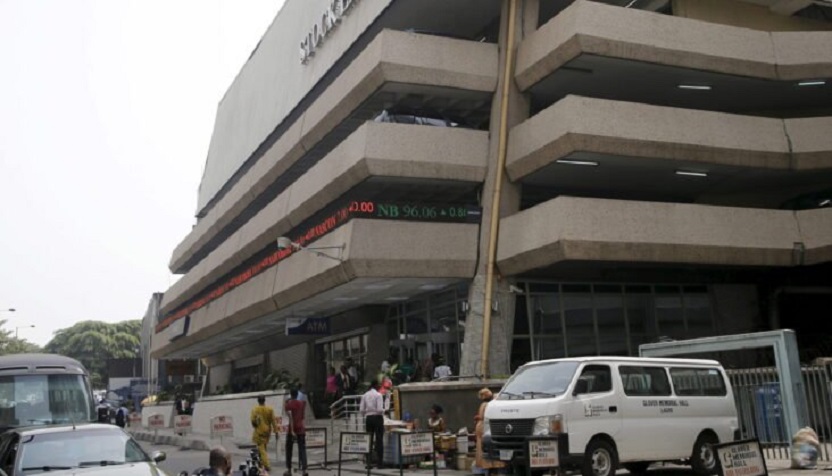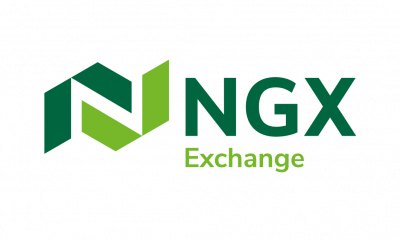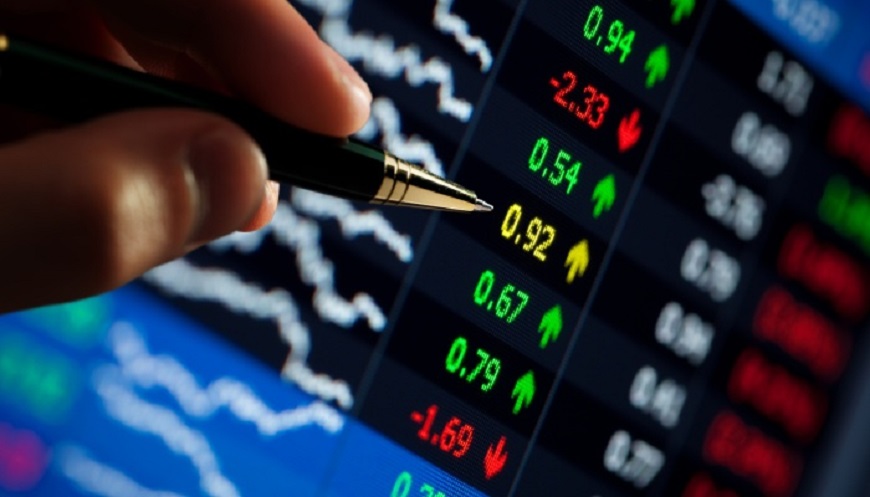Economy
Weekly Investment in Stocks Drops as Investors Monitor Environment

By Dipo Olowookere
The decision of politicians to stir up the race to Aso Rock in 2023 very earlier in 2022 is already taking its toll on the stock market in Nigeria.
Last week, former Governor of Lagos State and National Leader of the ruling All Progressives Congress (APC), Mr Bola Tinubu, declared his interest to President Muhammadu Buhari to contest the nation’s highest political position next year.
After his open declaration at the Presidential Villa, others started to announce their interest in the same position and the race started to get interesting with some parts of the country rooting for Vice President Yemi Osinbajo, who is believed to be the political godson of Mr Tinubu.
For investors in the capital market, they never expected this to occupy the ecosystem in the first month of 2022. They had thought the race to Aso Rock would get heated up by the second or third quarter of the year.
With the development, some of them had to trade cautiously and this may have caused the decline in the weekly investment in stocks last week.
According to data obtained by Business Post, a total of 1.6 billion shares worth N32.7 billion were traded in 22,607 deals as against the 2.0 billion shares worth N59.0 billion transacted in 15,750 deals in the first week of the year, which only had four trading sessions.
A breakdown showed that financial stocks dominated the activity chart in the week with 731.3 million units valued at 6.5 billion traded in 10,822 deals, contributing 45.71 per cent and 19.92 per cent to the total trading volume and value respectively.
Conglomerate equities trailed with 403.7 million units worth N452.9 million in 1,537 deals, while consumer shares exchanged 314.8 million units worth N17.8 billion in 4,101 deals.
Transcorp, BUA Foods and Jaiz Bank were the most active stocks in the five-day trading week, with the sale of 775.7 million units valued at N16.6 billion executed in 2,644 deals, accounting for 48.49 per cent and 50.82 per cent of the total trading volume and value respectively.
A total of 33 equities appreciated in price during the week, lower than 40 equities in the previous week, while 35 equities depreciated in price, higher than 31 equities in the previous week, with 88 equities closing flat, lower than 84 equities recorded in the previous week.
Analysis indicated that BUA Foods was the biggest price riser as its value went up by 24.06 per cent to N66.00, followed by Transcorp, which gained 16.33 per cent to trade at N1.14.
Jaiz Bank grew by 15.25 per cent week-on-week to sell for 68 kobo, Fidson appreciated by 13.64 per cent to quote at N7.50, while Academy Press improved by 10.00 per cent to trade at 66 kobo.
On the reverse side, Sunu Assurances ended the week as the heaviest price loser after its equity price went down by 16.22 per cent to close at 31 kobo.
Mutual Benefits fell by 12.90 per cent to 27 kobo, Berger Paints dropped 9.94 per cent to N7.70, Northern Nigerian Flour Mills depreciated by 9.66 per cent to N6.55, while Custodian Investment decreased by 9.49 per cent to N7.15.
Despite the low trades, the All-Share Index and market capitalisation of the Nigerian Exchange (NGX) Limited appreciated by 1.37 per cent week-on-week to 44,454.67 points and N23.951 trillion respectively.
Similarly, all other indices finished higher with the exception of NGX CG, insurance, NGX AFR Bank Value, consumer goods and Lotus II indices, which depreciated by 0.79 per cent, 1.54 per cent, 0.07 per cent, 4.35 per cent and 1.34 per cent respectively, while the ASem, NGX Growth I and sovereign bond indices closed flat.
Economy
LIRS Urges Taxpayers to File Annual Returns Ahead of Deadline

By Modupe Gbadeyanka
All individual taxpayers in Lagos State have been advised to file their annual tax returns ahead of the March 31 deadline.
This appeal was made by the Lagos State Internal Revenue Service (LIRS) in a statement issued by its Head of Corporate Communications, Mrs Monsurat Amasa-Oyelude.
The notice quoted the chairman of LIRS, Mr Ayodele Subair, as saying that timely filing remains both a constitutional and statutory obligation as well as a civic responsibility.
The statutory filing requirement applies to all taxable persons, including self-employed individuals, business owners, professionals, persons in the informal sector, and employees under the Pay-As-You-Earn (PAYE) scheme.
In accordance with Section 24(f) of the 1999 Constitution of the Federal Republic of Nigeria, Sections 13 &14(3) of the Nigeria Tax Administration Act 2025 (NTAA), every individual with taxable income is required to submit a true and correct return of total income from all sources for the preceding year (January 1 to December 31, 2025) within 90 days of the commencement of a new assessment year.
“Filing of annual tax returns is not optional. It is a legal requirement under the Nigeria Tax Administration Act 2025. We encourage all Lagos residents earning taxable income to file early and accurately.
“Early and accurate filing not only ensures full adherence with statutory requirements, but supports effective monitoring and forecasting, which are critical to Lagos State’s fiscal planning and long-term sustainability,” Mr Subair stated.
He further noted that failure to file returns by the statutory deadline attracts administrative penalties, interest, and other enforcement measures as prescribed by law.
To enhance convenience and efficiency, all individual tax returns must be submitted electronically via the LIRS eTax portal at https://etax.lirs.net. The platform enables taxpayers to register, file returns, upload supporting documents, and manage their tax profiles securely from anywhere.
In keeping with global best practices, Mr Subair reiterated that LIRS continues to prioritise digital tax administration and taxpayer support services. He affirmed that the LIRS eTax platform is secure and accessible worldwide. Taxpayers requiring assistance may visit any of the LIRS offices or other channels.
Economy
NNPC Targets 230% LPG Supply Surge to 5MTPA Under Gas Master Plan 2026

By Adedapo Adesanya
The Nigerian National Petroleum Company (NNPC) Limited has said the Gas Master Plan 2026 targets over 230 per cent scale-up of Liquefied Petroleum Gas (LPG) supply from 1.5 million tonnes per annum (MTPA) to 5 MTPA this year.
The Executive Vice President for Gas, Power and New Energy at NNPC, Mr Olalekan Ogunleye, unveiled the strategic direction of the NNPC Gas Master Plan 2026, outlining an aggressive expansion drive to position Nigeria as a regional and global gas powerhouse.
Mr Ogunleye delivered the keynote address at the 2026 Lagos Energy Week, organised by the Society of Petroleum Engineers (SPE), where he detailed plans to accelerate gas development, deepen infrastructure and significantly scale domestic supply.
According to him, the Gas Master Plan targets a scale-up of LPG or cooking gas supply from 1.5 MTPA to 5 MTPA, alongside expanded feedstock for Mini-LNG and Compressed Natural Gas (CNG) projects.
“The NNPC Gas Master Plan 2026 is a blueprint to unlock Nigeria’s vast gas potential and translate it into tangible economic value,” Mr Ogunleye said.
He added that the strategy would also drive exponential growth in Gas-Based Industries, GBIs, strengthening local manufacturing, fertiliser production and power generation.
“Our renewed focus is on turning abundant gas resources into inclusive economic growth and improved quality of life for Nigerians,” he stated.
Mr Ogunleye said the plan aligns with the Federal Government’s Decade of Gas initiative and the presidential production targets of achieving 10 billion cubic feet per day by 2027 and 12 BCF/D by 2030.
Industry leaders at the event, including executives from Chevron Corporation, Esso Exploration and Production Nigeria Limited, Midwestern Oil and Gas Company Limited, Abuja Gas Processing Company and Shell Nigeria Gas, commended the plan and praised Ogunleye’s leadership in driving implementation excellence.
The new blueprint signals NNPC’s determination to anchor Nigeria’s energy transition on gas, leveraging infrastructure expansion and domestic utilisation to consolidate the country’s status as Africa’s largest gas reserve holder.
Economy
Shettima Blames CBN’s FX Intervention for Naira Depreciation

By Adedapo Adesanya
Vice President Kashim Shettima has attributed the Naira’s recent depreciation to the intervention of the Central Bank of Nigeria (CBN) in the foreign exchange (FX) market, stating that the currency could have strengthened to around N1,000 per Dollar within weeks if the apex bank had allowed market forces to prevail.
The local currency has dropped over N8.37 on the Dollar in the last week, as it closed at N1,355.37/$1 on Tuesday at the Nigerian Autonomous Foreign Exchange Market (NAFEM), after it went on a spree late last month and into the early weeks of February.
However, speaking on Tuesday at the Progressive Governors’ Forum (PGF), Renewed Hope Ambassadors Strategic Summit in Abuja, the Nigerian VP said the intervention was to ensure stability.
“In fact, if not for the interventions by the Central Bank of Nigeria yesterday, the 1,000 Naira to a Dollar we are going to attain in weeks, not in months. But for the purpose of market stability, the CBN generously intervened yesterday.
“So, for some of my friends, especially one of our party leaders who takes delight in stockpiling dollars, it is a wake-up call,” the vice president said.
He was alluding to CBN buying US Dollars from the market to slow down the rapid rise of the Naira.
Latest information showed that last week, the apex bank bought about $189.80 million to reduce excess Dollar supply and control how fast the Naira was gaining value.
The move was aimed at preventing foreign portfolio investors from exiting Nigeria’s fixed-income market, as large-scale sell-offs could heighten demand for US Dollars, intensify capital flight, and exert further pressure on the exchange rate.
Amid this, speaking after the 304th meeting of the monetary policy committee (MPC) of the CBN on Tuesday, Governor of the central bank, Mr Yemi Cardoso, said Nigeria’s gross external reserves have risen to $50.45 billion, the highest level in 13 years.
This strengthens the country’s foreign exchange buffers, enhances the apex bank’s capacity to defend the Naira when needed, and boosts investor confidence in the stability of the Nigerian FX market.
-

 Feature/OPED6 years ago
Feature/OPED6 years agoDavos was Different this year
-
Travel/Tourism10 years ago
Lagos Seals Western Lodge Hotel In Ikorodu
-

 Showbiz3 years ago
Showbiz3 years agoEstranged Lover Releases Videos of Empress Njamah Bathing
-

 Banking8 years ago
Banking8 years agoSort Codes of GTBank Branches in Nigeria
-

 Economy3 years ago
Economy3 years agoSubsidy Removal: CNG at N130 Per Litre Cheaper Than Petrol—IPMAN
-

 Banking3 years ago
Banking3 years agoSort Codes of UBA Branches in Nigeria
-

 Banking3 years ago
Banking3 years agoFirst Bank Announces Planned Downtime
-

 Sports3 years ago
Sports3 years agoHighest Paid Nigerian Footballer – How Much Do Nigerian Footballers Earn

















